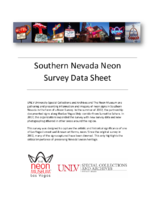Search the Special Collections and Archives Portal
Search Results

Kings Row Trailer Park Neon Survey document, September 14, 2017
Date
Archival Collection
Description
Site address: 3660 Boulder Hwy
Sign owner: Kings Row Trlr Pk Inc
Sign details: This property is still functioning as a mobile home park along Boulder Highway. They are one of the largest RV parks in Southern Nevada and within a close distance to downtown and Boulder Station Casino. They advertise that they have some of the best deals in town as well as about 200 spaces available. They have been operating in Las Vegas for more than 60 years.
Sign condition: 5 - in great condition, well maintained
Sign form: Roadside pole with a message center and directional elements
Sign-specific description: This sign is made up of many different small cabinets. The top is a painted crown that is plastic and backlit. This sits on top of a red minimal arrow sign that points to the direction of the trailer park. This sign has yellow incandescent light bulbs lining the edge with "Kings Row" painted in white paint on the top of the sign, "Trailer Park" painted in bold yellow text in the center, and the text is outlined with neon tubes. The cabinet under this is a long, red trapezoid with "OVERNITES" painted on it in bold white text that is also outlined with neon tubes. Under this is what appears to be an iron flourish on top of another plastic backlit sign. This sign as "RV SPACES" painted on it in bold red text over yellow paint, "INDOOR HOMES TRAILERS CAMPING" in bold red text against a white background, and "MOBILE HOME SPACES POOL REC HALL" in bold red text against a yellow background. Under this is another iron flourish. Following that sign is a plastic backlit reader board. Under that is a plastic backlit sign with "CAMPERS" in white text and underlined against a red background. Finally, there is another plastic sign in the shape of an arrow with "Kings Row" in a light blue script, "ENTRANCE " in red, and "TRAILER PARK" in black inscribed on it.
Sign - type of display: Neon, incandescent, backlit
Sign - media: Steel and Plastic
Sign - non-neon treatments: Paint
Sign environment: This property sits along Boulder High way and near many other RV rental businesses. It is also down the street from Boulder Station Hotel & Casino.
Sign - date of installation: Possibly c. 1962
Sign - date of redesign/move: Current sign not the original, which was a long rectangular shape cabinet
Sign - thematic influences: This sign is very unique to the RV park. To emphasize the "Kings Row" theme, the crown perched on the top of the sign is designed to help with this. Much of this sign is used to tell motorists and pedestrians what the property has.
Sign - artistic significance: This sign is elaborate. There are many different elements to this sign overall. This sign is that there is a crown to signify the royal theme of this property, possibly as a way to differentiate from other RV park signs around town.
Survey - research locations: Kings Row website, assessor's website
Surveyor: Lauren Vaccaro
Survey - date completed: 2017-09-14
Sign keywords: Neon; Incandescent; Backlit; Steel; Plastic; Paint; Pole sign; Roadside; Directional; Reader board
Text
Senator Chic Hecht Political Papers
Identifier
Abstract
The Senator Chic Hecht Political Papers (1943-1988) contain the political papers of United States Senator and Las Vegas, Nevada businessman Chic Hecht. The bulk of the collection contains legislation, notes, correspondence between Hecht and constituents and other members of Congress, and speeches from Senator Hecht's term in the Senate from 1982 to 1988. Also included are files on civil service, the federal budget, education, labor, transportation, land management, foreign policy, public health, and trade.
Archival Collection
University of Nevada, Las Vegas Creative Services Records (2000s)
Identifier
Abstract
This is part 4 of 6 finding aids for the University of Nevada, Las Vegas Creative Services Records and represents 2000 to 2009. Generally, materials are transferred from UNLV Photo Services to UNLV Special Collections and Archives 5 years after they are created. For materials within the last 5 years, contact photo@unlv.edu or call 702-895-3036. This finding aid contains the contact sheets and digital files produced by the University of Nevada, Las Vegas from 2000 to 2009 as an official record of the institution's development, activities, and community. Clients include UNLV colleges and departments, the University's administration, the UNLV Foundation, athletic departments, and the Nevada System of Higher Education (NSHE). Images include academic activities, athletic events, faculty and administration, student life, campus life, campus development, architecture, and public relations.
Archival Collection
Ralph Roske Papers
Identifier
Abstract
The Ralph Roske Papers (1957-1989) consist of Ralph Roske's book manuscripts, lecture notes, and correspondence. The collection includes extensive lecture notes on the United States Civil War, United States history, and Nevada history. It also includes Roske's research and manuscripts on Nevada, California, and the United States Civil War, as well as student
papers. Ralph Roske was a professor of history at the University of Nevada, Las Vegas (UNLV).
Archival Collection
Charlotte Hill Papers
Identifier
Abstract
The Charlotte Hill Papers (1975-1996) document Charlotte Hill’s commitment to the Las Vegas, Nevada community and especially to the local PBS affiliate, KLVX Channel 10. The majority of the collection relates to KLVX Channel 10 and the work of the Friends of Channel 10 on behalf of the station, in particular information about fundraising events and volunteers. It also contains material related to Hill's membership in national organizations associated with public broadcasting. The collection includes some material about her work with the American Camping Association and the Las Vegas Sun Summer Camp Fund.
Archival Collection

James L. Hogan interview, March 11, 1978: transcript
Date
Archival Collection
Description
On March 11, 1978, collector Patty L. Baratti interviewed James Hogan (born April 6th, 1909 in Winton Place, Ohio) at his home in Las Vegas, Nevada. In this interview, Hogan talks about his time working with the telephone company in Arizona and moving to Las Vegas, Nevada. He discusses his time working on grazing rights and cattle ranching in Nevada and how planning went to ensure that farms were able to have land to graze their animals. He speaks about dealing with farmers, corporations, and the government and the frustrations he had to deal with before there were set laws about grazing. He also discusses the change from mainly family farms in Nevada to corporations owning much of the farmland.
Text

Maria Benítez oral history interview: transcript
Date
Archival Collection
Description
Oral history interview with Maria Benítez conducted by Monserrath Hernández and Maribel Estrada Calderón on June 21, 2019 for the Latinx Voices of Southern Nevada Oral History Project. Maria Benítez is the image of a hardworking and determined Salvadoran woman. After facing adversity amidst the Salvadorian Civil War she talks about her journey as a nurse in El Salvador and migrating to the United States. Here in Las Vegas, she has worked as a cook on the Strip, been an active member of her church, and supported the education of her children selling pupusas. Subjects discussed include: El Salvador, Salvadorian Civil War, Migration, US Citizenship Documentation, and Judaism.
Text

University of Nevada, Las Vegas (UNLV) 45th commencement program
Date
Archival Collection
Description
Commencement program from University of Nevada, Las Vegas Commencement Programs and Graduation Lists (UA-00115).
Text

Transcript of interview with Jan Kennedy by Barbara Tabach, September 7, 2011
Date
Archival Collection
Description
Jan Kennedy was born (1924) Janet Parmelee, the daughter of a Connecticut physician and a homemaker. In high school she met Norman Kennedy, who she would marry after both had attended college and to whom she was married for 64 years. Until 1963, their roots seemed to be taking hold in the Seattle area. That is until Norm was offered an attractive career opportunity as a weather man at the Nevada Test Site. They settled in and enjoyed a zest-filled life with their four sons and a dynamic group of friends who they often entertained at their cabin in Mount Charleston. In addition, Jan managed to volunteer for a list of organizations including UMC Hospital/Southern Nevada Memorial Hospital; Clark County Museum Guild; Salvation Army Women's Auxiliary; church deacon; Assistance League; Red Hats—keeping herself ever busy and joyfully satisfied.
Text

Transcript of interview with Burton Cohen by Claytee White, January 9, 2009
Date
Archival Collection
Description
In this interview, Burton Cohen discusses his involvement in the Las Vegas casino industry, including booking entertainment for various hotels.
Burton Cohen's long casino executive career began in the mid-1960s when he accepted a proposition to become involved with the transformation of the Frontier Hotel. He left his south Florida roots and law practice to become a co-owner/general manager of the Frontier Hotel. Thus, began his highly regarded Las Vegas presence. For nearly four decades he served in the management of some of the Strip's most famous casinos: Flamingo, Dunes, Circus Circus, Caesar Palace, Thunderbird and the Desert Inn, which remains his favorite. In this interview, Burt reflects on the positions he held, the celebrities he hired and befriended, and offers a unique look at the behind the scenes marketing and entertainment strategies that he helmed. He shares stories of becoming entrenched in casino operations, his reflections of union experiences, and even anecdotes about moving his mother to Las Vegas.
Text
